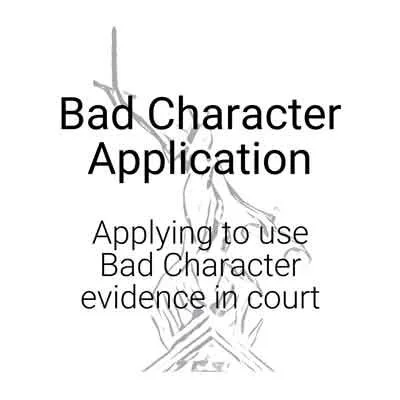Bad Character
How evidence of the bad character of a defendant or witness is used at trial
All Contents > Good Character > Bad Character > Witness Evidence & Questioning
“Where defendants have ‘bad character’ such as previous convictions for offences similar to those they are being tried for, the prosecution might wish to use these to support the prosecution case. Similarly, the defence may wish to rely on the dishonesty convictions of a prosecution witness to show that they are someone whose evidence is less likely to be believed.”
On this page:
What is Bad Character?
The Bad Character Application
When is a Bad Character application required?
Grounds for relying on the Bad Character of defendants
Grounds for relying on the Bad Character of witnesses and other third parties
Spent convictions and Bad Character evidence
The Bad Character Direction - how evidence of Bad Character is used in court
How to exclude Bad Character evidence
Bad Character Further Information
What is Bad Character?
Where defendants have ‘bad character’ such as previous convictions for offences similar to those they are being tried for, the prosecution might wish to use these to support the prosecution case. Similarly, the defence may wish to rely on the dishonesty convictions of a prosecution witness to show that they are someone whose evidence is less likely to be believed.
These are examples of ‘bad character’ evidence which can be used by both the prosecution and defence in a variety of ways and for various specific purposes.
Definition
Bad Character is defined in the Criminal Justice Act 2003 as follows:
“s.98 “Bad character”
References ... to evidence of a person’s “bad character” are to evidence of, or of a disposition towards, misconduct on his part, other than evidence which—
(a) has to do with the alleged facts of the offence with which the defendant is charged, or
(b) is evidence of misconduct in connection with the investigation or prosecution of that offence.
s.112 Interpretation
“misconduct” means the commission of an offence or other reprehensible behaviour;”
This means that Bad Character is evidence of:
Convictions or cautions; and/or
other ‘reprehensible’ behaviour; and
which in either case do not specifically relate to the facts of the offence being tried at court, or to the investigation or prosecution of that offence.
Reprehensible Behaviour
‘Reprehensible behaviour’ is not specifically defined in the Criminal Justice Act 2003.
What could be considered reprehensible in one set of circumstances might not be so considered in another context, so each case is different and must be viewed on its own facts. Behaviour which amounts to criminal conduct, even though there is no formal criminal conviction (e.g. because it was not reported at the time) is likely to amount to reprehensible behaviour.
















